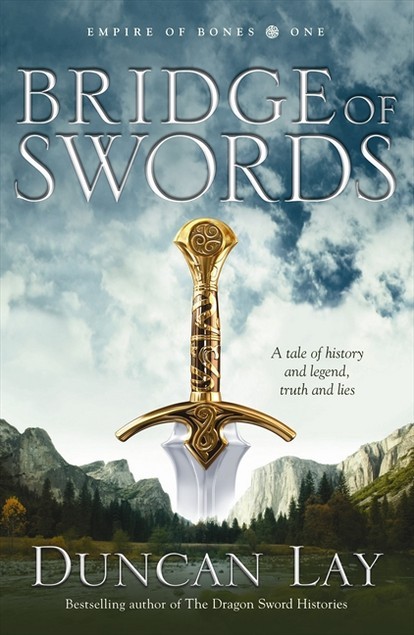 Bridge of Swords is the first book in Duncan Lay’s second trilogy, Empire of Bones. It is set about three hundred years after the Dragon Sword Histories (The Wounded Guardian, The Radiant Child and The Risen Queen), however you definitely need not have read the first series for this one to make sense. Given the large time gap, there are no common characters and in the interim the face of the world has changed significantly so that even those who have read the first series will find it relatively unfamiliar at the start.
Bridge of Swords is the first book in Duncan Lay’s second trilogy, Empire of Bones. It is set about three hundred years after the Dragon Sword Histories (The Wounded Guardian, The Radiant Child and The Risen Queen), however you definitely need not have read the first series for this one to make sense. Given the large time gap, there are no common characters and in the interim the face of the world has changed significantly so that even those who have read the first series will find it relatively unfamiliar at the start.There are three central characters in Bridge of Swords: Sendatsu the elf, Huw the bard and Rhiannon the dancer. Sendatsu found himself inadvertently at the centre of a conflict among his secluded people and travelled into the human world to help resolve it. Throughout the story, he misses and pines for his young children whom he was forced to leave behind. The focus on the relationship between father and young children is not something that is often a strong element of fantasy writing, perhaps to its detriment — in fact the only other example I can think of is in Lay’s Dragon Sword Histories. Lay’s writing shows that positive father figure and heroic fighter need not be mutually exclusive characteristics.
Huw, the bard from Vales, travelled to the Forlish king’s court to play the lute. While there he became enamoured of the talented dancer Rhiannon and also learnt about the king’s plans to subdue and conquer Vales. Compelled to leave court and warn his homeland, he convinces/tricks Rhiannon into coming with him. In the course of events, they team up with Sendatsu and find themselves helping Velsh villages mount defences against the Forlish.
I liked that none of the main characters were perfect people and enjoyed watching them grow throughout the book. As I’m one for moral shades of grey characters, I enjoyed the two men more than Rhiannon. Although she definitely grows during the story, she goes from naïve to more worldly without really doing anything morally ambiguous, unlike the other two.
Something Lay does well is write about the minutiae of battles. I don’t mean the blow by blow account — although that’s good too — I mean the details of the preparation and organisation. I noted in in the Dragon Sword Histories and it shone through again in Bridge of Swords. I really appreciate the attention to detail and the research that obviously goes into the world-building.
All in all, I definitely recommend Bridge of Swords to fantasy lovers, especially those that enjoy fight scenes. And enjoyable read which left me hanging for the next book — especially after that cliffhanger ending, yeesh.
4.5 / 5 stars

No comments:
Post a Comment
Note: only a member of this blog may post a comment.